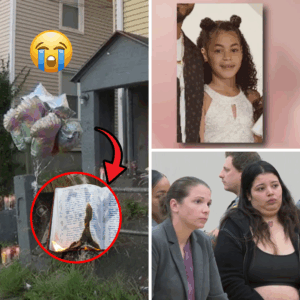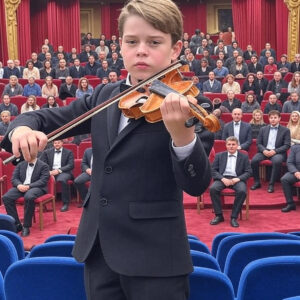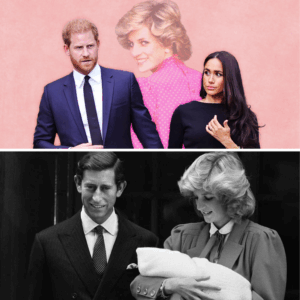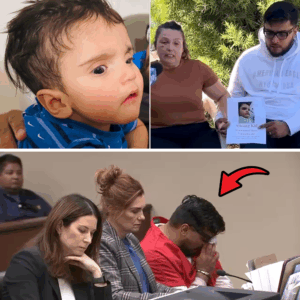In the quiet suburbs of Yucaipa, California, where rolling hills meet strip malls and families chase the American dream, a nightmare unfolded on a warm August evening in 2025. Rebecca Haro, a 41-year-old mother, burst into the local Big 5 Sporting Goods store, frantic and disheveled, claiming she had been viciously attacked in the parking lot. As she changed her seven-month-old son’s diaper in their car, she recounted, an unknown assailant struck her from behind, knocking her unconscious. When she came to, her baby boy, Emmanuel Haro—cherubic, with bright eyes and a gummy smile—was gone. Stolen, she insisted, in a brazen kidnapping right under the fluorescent glow of the lot’s lights.
The story spread like wildfire through Riverside County. Neighbors rallied, volunteers combed nearby trails, and social media lit up with pleas for tips. Emmanuel’s parents, Jake and Rebecca Haro, appeared on local news, their faces etched with exhaustion and desperation. Jake, 32, a stocky man with a tattooed arm and a voice thick with emotion, described his son as a “little fighter” who loved kicking his legs and cooing at toys. Rebecca clutched a stuffed bear, tears streaming, vowing to bring her boy home. For a fleeting moment, the community united in grief, plastering posters of Emmanuel’s round face across telephone poles and praying for a miracle.
But miracles, it turned out, were in short supply for the Haro family. Within days, the narrative cracked under the weight of scrutiny from the San Bernardino County Sheriff’s Department. Inconsistencies piled up: Rebecca’s injuries didn’t match her account of a brutal assault. The couple’s cooperation waned; phone calls went unanswered, and alibis shifted like sand. On August 22, just eight days after the alleged abduction, detectives descended on the Haro home in nearby Cabazon—a dusty enclave of mobile homes and desert scrub. Jake and Rebecca were arrested in a predawn raid, charged not with aiding a kidnapping, but with murder. Emmanuel, authorities revealed, was never taken by strangers. He was dead, allegedly at the hands of the very people sworn to protect him. His tiny body has never been found, leaving a void that echoes through courtrooms and shattered lives.

The case exploded into headlines, a stark reminder of the darkness that can lurk behind closed doors. Yet, as Jake Haro stood shackled before a Riverside County judge on November 3, 2025, pleading for mercy in a voice choked with sobs, a deeper, more haunting truth emerged. This wasn’t his first brush with unimaginable cruelty. Seven years earlier, in 2018, Jake had been convicted of willfully abusing another child—his infant daughter from a previous relationship. That little girl, now seven years old and renamed Promise Faith by her adoptive family, bears the scars of a violence so profound it robbed her of speech, sight, and the simple joy of walking. Emmanuel’s story, it turned out, was not an isolated horror, but the tragic sequel to a pattern of brutality that the justice system had once forgiven with a slap on the wrist.
To understand the full weight of Jake Haro’s crimes, one must rewind to that sweltering summer of 2018. Jake, then 25 and married to his first wife, lived in a modest apartment in the Inland Empire, juggling odd jobs and the demands of young parenthood. His daughter, a mere 10 weeks old and weighing less than a bag of flour, was the picture of vulnerability—pre-mobile, dependent entirely on her caregivers for survival. But what should have been a time of tender milestones devolved into a medical emergency that horrified even seasoned pediatricians.
On a routine visit to Loma Linda University Medical Center, doctors uncovered a litany of injuries that screamed of abuse. X-rays revealed an acute fracture in one rib, alongside healing breaks in six others—cracks that suggested repeated, forceful compressions. A skull fracture marred her fragile head, accompanied by a brain hemorrhage that swelled her tiny brain against its bony cage. Her neck was unnaturally puffy, indicative of strangulation or blunt force, and a healing fracture in her leg bone hinted at earlier, undetected trauma. Nutritional neglect compounded the horror; the infant was malnourished, her body a roadmap of deprivation.
Jake’s explanations unraveled under questioning. He claimed a family member had accidentally dropped her, or that she had rolled off a couch—stories that crumbled against the forensic evidence. In a chilling detail uncovered during the investigation, police seized his iPad and found a browser history search: “How to feed a baby with broken ribs.” Jake denied accessing the device that day, but the digital footprint painted a damning picture. Doctors diagnosed abusive head trauma, a form of shaken baby syndrome that often leaves survivors with lifelong disabilities. This child, they warned, might not survive the week.
Miraculously, she did. Against all odds, the infant stabilized, her fighting spirit earning her the nickname “miracle baby” among the nurses who fought to save her. But survival came at a devastating cost. The brain bleed and fractures triggered cascading neurological damage. Today, Promise Faith—adopted by a compassionate cousin of Jake’s ex-wife who gave her a name symbolizing hope—cannot walk without assistance, cannot speak in sentences, and navigates the world through a haze of partial blindness. Her days are filled with therapies, adaptive equipment, and the unwavering love of a family that chose her when her biological one failed. “She’s our Promise,” her adoptive mother says softly, her voice a mix of pride and profound sorrow. “But every milestone she misses is a reminder of what was stolen from her.”
Jake Haro’s plea in that case was swift: guilty to one count of willful child cruelty, a felony that carried the potential for years behind bars. Yet, in a decision that would later haunt prosecutors, the judge opted for leniency. Probation, community service, and mandatory parenting classes—framed as a “second chance” for a young father who expressed remorse. No prison time. The court records note Jake’s tearful apologies and promises to change, a narrative that echoed eerily in the courtroom years later. Riverside County District Attorney Mike Hestrin, reflecting on the ruling during Emmanuel’s case, didn’t mince words: “It was an outrageous error in judgment. If that judge had sent him away, my office wouldn’t be here today prosecuting the murder of an innocent baby.”
Fast-forward to 2025, and the ghosts of 2018 resurfaced with brutal clarity. Emmanuel Haro entered the world in January, a bundle of joy amid the Haros’ strained marriage. Jake and Rebecca, now wed, lived in Cabazon, scraping by on his construction gigs and her part-time work. To outsiders, they projected normalcy—barbecues with extended family, holiday photos on social media. But cracks simmered beneath: arguments over money, isolation from Rebecca’s relatives, and whispers of Jake’s volatile temper. Emmanuel’s maternal grandmother, Mary Beushausen, a sturdy woman with a no-nonsense demeanor, later testified that Jake kept her at arm’s length. “He never let me meet the baby,” she said, her voice cracking. “If I’d known, I would’ve dragged my daughter out of there myself.”
The alleged kidnapping on August 14 was the spark. Rebecca’s story—assaulted while Emmanuel slept in his car seat—quickly frayed. No witnesses corroborated the attack; security footage showed no suspicious figures. Detectives noted her “minor” head bump didn’t align with unconsciousness. As the search intensified, warrants revealed deleted texts and suspicious GPS pings. A key break came during a grid search near the 60 Freeway in Moreno Valley, where Jake, under questioning, allegedly pointed investigators to a remote spot. Cadaver dogs alerted, but Emmanuel’s remains eluded recovery—a final, cruel evasion.
Prosecutors pieced together a timeline of abuse. Emmanuel, once a robust crawler, had shown signs of distress in the weeks prior: unexplained bruises, lethargy, failure to thrive. Autopsy details, though pending due to the missing body, point to prolonged trauma—shaking, impacts, neglect—that mirrored Promise’s ordeal. Jake, described in court filings as an “experienced child abuser,” allegedly escalated in a fit of rage on the night of August 14. Rebecca’s role remains murkier; charged as an accessory, she faces accusations of covering up the crime, including the false report that mobilized—and misled—an entire community.
By September, the facade crumbled. Jake, facing mounting evidence, flipped. On October 16, in a packed Riverside courtroom, he entered guilty pleas to second-degree murder, assault on a child resulting in death, and filing a false police report. Tears streamed as he muttered, “I’m so sorry,” his broad shoulders heaving. Rebecca, standing nearby, held firm with a not guilty plea, her preliminary hearing delayed until January 2026. Her defense paints her as a victim of coercion, trapped in an abusive dynamic, but prosecutors counter that her silence enabled the horror.
Sentencing day arrived like a thunderclap. Judge Gary Polk, peering over wire-rimmed glasses, surveyed the gallery packed with deputies, advocates, and Emmanuel’s grieving kin. Jake, in an orange jumpsuit, kept his gaze down. The charges carried a life sentence, but the plea deal capped it at 25 years to life—eligibility for parole only after the minimum. Added to that: over six years for probation violations from the 2018 case, plus $10,000 in restitution and fines topping $20,000. “You were supposed to protect these defenseless children,” the judge intoned, his voice steady. “This sentence is the most justice we can extract from this abyss.”
Mary Beushausen took the stand, her words a raw indictment. “You destroyed my family, Jake,” she said, locking eyes with the man who had charmed her daughter into isolation. “You changed Rebecca into someone I don’t recognize. My grandchildren—gone. My heart—shattered. Why? Tell me why.” Jake offered no response, only more tears. In the audience, Promise’s adoptive family watched silently, their presence a quiet testament to survival amid ruin.
The ripple effects extend far beyond one courtroom. Child welfare experts decry the Haro saga as a systemic failure. Probation for severe infant abuse, they argue, ignores the recidivism risks—studies show abusers reoffend at rates up to 50% without incarceration. In California, shaken baby cases have surged post-pandemic, with overburdened social services struggling to intervene. Emmanuel’s death, the DA emphasized, was preventable; a stiffer 2018 penalty might have dismantled the Haro household before it claimed another life.
As winter looms over Yucaipa, the search for Emmanuel persists. Volunteers still canvas arroyos, and tips trickle into sheriff’s lines. Rebecca awaits trial, her bond denied, while Jake begins his decades-long bid for redemption behind bars. Promise Faith, oblivious to the headlines, marks her seventh birthday with a cake and a new puzzle—milestones Jake will never witness. In the end, the Haro tragedy isn’t just about one missing baby or a father’s fall. It’s a mosaic of missed warnings, fractured trust, and the indelible cost of unchecked rage. In the suburbs where dreams die quietly, Emmanuel’s absence serves as both elegy and alarm: some shadows, once cast, never fully lift.





